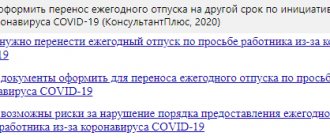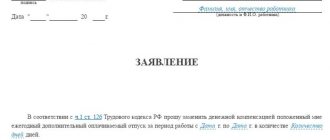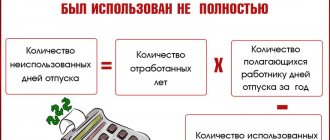There was a rumor among employees of many organizations that, according to the Labor Code, vacation not taken will be forfeited. The Labor Code has been supplemented with new conditions for providing mandatory days of rest, but these changes have not affected all citizens. For most, nothing has changed on this issue. The assumption that due to changes in the Labor Code of the Russian Federation, unused vacations will expire in 2020 is incorrect. In addition, unused days have nothing to do with amendments to the Labor Code.
Does unused vacation expire?
Many people wonder whether unused vacation expires or not. In accordance with current legislation, an employee has the right to 28 days of annual paid leave. It is also called the main one. However, some professions and regions have additional holidays.
According to the Labor Code, the main vacation must be taken during the current year. By agreement with the employee, leave can be divided into several parts, one of which must be at least 14 days. If the employee did not use the allotted vacation during the year (for good reasons), then its unused part can be transferred to the next year (Article 124 of the Labor Code of the Russian Federation). At the same time, the law prohibits not providing vacation for 2 years. That is, a debt of 56 days of vacation is a gross violation of the law.
Thus, we can conclude that unused vacation by the employee does not disappear and is not burned. Upon dismissal for the entire vacation period not taken by the employee, the employer is obliged to pay vacation pay.
Commentary on Article 122 of the Labor Code of the Russian Federation
The right to use vacation for the first year of work arises for the employee after 6 months of his continuous work in this organization. By agreement of the parties, paid leave can be provided to the employee before the expiration of 6 months (Article 122 of the Labor Code of the Russian Federation).
Before the expiration of 6 months of continuous work, paid leave at the request of the employee must be provided (Article 122 of the Labor Code of the Russian Federation):
1) for women - before maternity leave or immediately after it;
2) employees under the age of 18;
3) employees who adopted a child under three months of age;
4) in other cases provided for by federal laws.
Leave for employees is granted for 28 calendar days. However, the vacation period does not include holidays.
When determining the duration of vacation, the organization's working hours (6-day or 5-day working week) do not matter.
This is the minimum duration guaranteed by law at the federal level. Therefore, annual basic leave cannot be less than 28 calendar days. However, it may exceed the specified number of days. This is done in two ways: regulatory and contractual. We are talking about extended basic leave provided to certain categories of workers in accordance with Part 2 of Article 115 of the Labor Code of the Russian Federation and other federal laws.
These categories include:
1) employees under 18 years of age (minimum duration of vacation - 31 calendar days);
2) disabled people (minimum duration of leave - 30 calendar days);
3) employees of child care institutions (minimum duration of leave - 42 calendar days);
4) employees of educational institutions and teachers (minimum duration of leave - from 42 to 56 calendar days);
5) prosecutors and investigators of the prosecutor's office (minimum duration of leave - 30 calendar days), etc.
People working part-time are granted annual paid leave simultaneously with leave for their main job (Article 286 of the Labor Code of the Russian Federation). If an employee has not worked for 6 months at a part-time job, leave is provided in advance.
As mentioned above, leave can be granted before the right to it accrues, i.e. in advance. In this case, the vacation must be complete, i.e. duration established by law, and also paid in full. The issue of the possibility of providing leave in advance can also be regulated in a collective agreement or other local regulatory act of the organization.
Vacation for the second and subsequent years of work can be granted at any time of the year in accordance with the vacation schedule.
The vacation schedule is drawn up no later than two weeks before the start of the calendar year. The schedule indicates the names of employees entitled to leave, their positions, the structural unit in which they work, the number of days and the planned period of leave.
It is prohibited not to provide leave to an employee for two consecutive years.
The next annual leave must be granted before the end of the current working year.
If the reasons preventing the employee from going on vacation occurred before it began, then the new period is determined by agreement with the employee.
Employees who have entered into an employment contract for a period of up to 2 months are provided with paid leave or compensation upon dismissal at the rate of two working days per month of work.
By agreement between the employee and the employer, annual paid leave can be divided into parts. Moreover, at least one part of this leave must be at least 14 calendar days (Article 125 of the Labor Code of Russia).
Annual paid leave by agreement between the employee and the employer is transferred to another period if the employee was not paid in a timely manner during this leave or the employee was notified about the start time of the leave less than two weeks before it began.
An employee going on vacation is paid average earnings (vacation pay).
Payment for vacation is made no later than three days before it starts.
The amount of vacation pay is subject to personal income tax, unified social tax, contributions to compulsory pension insurance and insurance against industrial accidents and occupational diseases in the usual manner.
The amount of vacation pay is calculated based on the employee’s average daily earnings. The general procedure for calculating average earnings when paying for vacation is established in Article 139 of the Labor Code of the Russian Federation.
Compensation for vacations that were not previously used
As it became known, unused vacation does not expire and does not go anywhere.
Days that are not used do not disappear. But the law prohibits accumulating more than necessary. The Code also establishes that a manager cannot refuse to provide time for rest. Such a violation may result in a fine of at least 50 thousand rubles.
Until recently, it was possible not to go on vacation, but to get money for it. Currently, only those who have a vacation duration of more than 28 days per year can receive compensation for vacation - these are, for example, extended or additional vacations. If an employee is only entitled to vacation of 28 calendar days, then it is impossible to replace part or all of this vacation with money! Vacation cannot generally be postponed for more than 24 months. And it is no longer profitable for management to accumulate vacation days.
This is due to several reasons:
- When checking, the Labor Inspectorate may ask many unnecessary questions.
- The more unused vacation an employee accumulates, the more the company will incur costs for compensation.
But employers often still try to reduce rest time. For this purpose, several techniques are used:
- Vacation is given, but it starts on Friday. That is, legal days off are added to the days of rest.
- The employee is not allowed to rest at all, but is asked to write a statement, for example, on weekends.
- The leave is issued, but in fact the employee continues to perform his duties.
These methods cannot be called effective. The management of the enterprise convinces that an employee can receive two payments at once - wages and vacation pay. And in this case, the employee loses the right to legal rest.
Is it possible to replace vacation with money?
Vacation cannot be replaced by compensation. Even the vacation that the employee has not taken for more than two years. The employee can only take these days off on vacation. At the same time, vacation pay is paid for the vacation, which can be calculated using our calculator.
Some employees are entitled to additional vacation days in addition to these 28 days. This:
- Workers engaged in work with harmful and (or) dangerous working conditions (Article 117 of the Labor Code of the Russian Federation)
- Employees with a special nature of work (Article 118 of the Labor Code of the Russian Federation)
- Workers with irregular working hours (Article 119 of the Labor Code of the Russian Federation)
- Workers employed in the Far North and equivalent areas (Article 321 of the Labor Code of the Russian Federation)
These additional days can be replaced with compensation. Compensation is calculated in the same way as regular vacation pay.
Vacation is also replaced with money if the employee quits. This case is discussed in a special article on our website.
To receive up-to-date information without delays, subscribe to Simplified. Today we are giving away 4 months for a 6 month subscription. Pay for six months, and read for 10 months!
Account for 6 months. + 4 months as a gift →
Pay by card →
Quick subscription by phone.
Calculation of the number of vacation days upon dismissal
To calculate the vacation period upon dismissal of an employee, it is necessary to make the following calculations, which are presented in the table:
| Stage number | Index | Calculation algorithm |
| Stage 1 | Determination of length of service in months | Only those months in which professional activity lasted more than 15 days are taken into account. |
| Stage 2 | Determining the number of vacation days per month worked | The total duration of annual vacation is divided into 12 months (28/12) |
| Stage 3 | We determine the total amount of vacation for the entire length of service | length of service in full months is multiplied by the number of vacation days in 1 month |
| Stage 4 | Definition of unused vacation | The vacation already used is subtracted from the total amount of vacation. |
The peculiarity of calculating vacation compensation is that not calendar months, but working months are taken into account. The working year begins to be counted starting from the day of hiring.
If for one full working year there are 28 calendar vacation days, then for 1 full month there are 2.33 days.
Example: Sokolov was hired on 02/01/2014. Resigns on February 28, 2017. The length of service for calculating the vacation period is 3 years 1 month. During this period, Sokolov was on annual paid leave 2 times, 28 days each. Only 56 days. It is required to calculate the days of compensation for unused vacation upon dismissal.
Calculation:
3 years and 1 month. - that's 37 full months.
If 1 year is 28 calendar days, then 37 months is 37*2.33 = 86.21 days.
Sokolov managed to take 56 days off, which means the number of days of unused vacation is 30.21 days.
30.21 days can be rounded up to 31 or not rounded at all.
for the specified days you need to pay monetary compensation, for which the average earnings for the year are multiplied by the number of unused days. The result of the calculations will be monetary vacation compensation paid upon dismissal.
How have the courts applied the provisions of the ILO Convention?
Some courts have viewed this rule as one of the time limits during which an employee can go to court to recover money for unused vacations.
This was done, in particular, by the Moscow City Court and the St. Petersburg City Court. Directly opposite decisions were made by the courts, which interpret the provisions of the Convention as establishing only a maximum period for using vacation during the period of validity of the employment contract and in no way limiting a certain part 1 of Art. 127 of the Labor Code of the Russian Federation, the scope of the right of a dismissed employee to receive monetary compensation for unused vacation.
Source:
Specialists from the best company for accountants “What to do Consult”
Heading:
Personnel
unused vacation compensation for unused vacation labor relations vacation
Sign up 6825
9750 ₽
–30%
Compensation for unused vacation when going on maternity leave
The law allows pregnant women to extend the period of maternity leave by increasing its duration using unused vacations:
| Indicators | Methods of use |
| If an employee has well-deserved but unused annual leave | add the required vacation days to the sick leave |
| extend the period of maternity leave, that is, leave maternity leave as much later as unused leave allows | |
| take vacation in advance, that is, by agreement with the employer, ask for early use of the vacation provided by law against future periods |
The last option is the least popular with the employer, since there is no guarantee that the employee will return from maternity leave after 1.5 or 3 years and work out the paid period (
The employer “kicks you out” on vacation
The simplest and most acceptable option for all parties is if the employee still takes his vacation, at one time or in parts (Article 125 of the Labor Code of the Russian Federation). Accordingly, he will be able to rest and receive vacation pay for this period.
The situation is worse when an employee is asked to write several applications for short vacations that fall only on weekends - traditionally Saturday and Sunday. The employer, when recommending this option, usually reminds that the employee will receive more money. After all, for each such day off the employee will be paid vacation pay. At the same time, in such a situation, the employee’s vacation days actually expire. Because he wouldn’t work on weekends anyway, and he could take a vacation later, and at the same time receive not only the same vacation pay, but also have a full rest.
The most unfavorable option for an employee is to take a vacation and at the same time continue to work as if there was no vacation at all. In such a situation, the employee is paid vacation pay for the days he works, but he simply loses the money he earned. After all, he does not officially work during this period. And again, there is no need to talk about any vacation here.
Is it possible to take vacation for 2021 in 2019?
For a number of reasons, they do not have time to take off their allotted days, and unused vacations accumulate. It turns out that this state of affairs does not suit many employers. There are several reasons for this:
- When inspected by the labor inspectorate, its specialists will probably ask why the company’s employees do not exercise their right to annual rest. Failure to comply with the requirements of the Labor Code of the Russian Federation for the employer is fraught with the issuance of orders and the accrual of fines. Also see “Procedure for granting annual paid leave”.
- In the event of dismissal of an employee who has not taken leave for a long time, the amount of compensation due to him will be quite large. This may have a negative impact on the company's spending budget.
- An employee who has accumulated a large amount of vacation arrears may suddenly decide to exercise his right to vacation and insist that he wants to take some time off immediately.
All days of rest due to the employee must be taken off. If in the current annual interval the employee did not take all the vacation, but only part of it, in the next reporting period he can:
- take the rest of the days off for the previous year, and later submit a separate application for leave for the new period;
- add the unused balance to a new vacation and take off all days at once.
Those being laid off have the opportunity to use up all accumulated vacation before the date of conversion of the employment relationship or replace the vacation with monetary compensation. In general, annual leave does not expire. It applies to both those who continue to work at the enterprise and those who are about to quit.
Online magazine for accountants
Therefore, sometimes both employers and employees themselves wonder whether it is possible to simply receive monetary compensation instead of absence from work? But, according to the norms of Art. 127 of the Labor Code of the Russian Federation, this is possible only in strictly defined situations:
- upon dismissal from work;
- if there are additional days (beyond the usual 28).
Such additional days of rest are provided for:
- persons specified in Art. 116 Labor Code of the Russian Federation;
- persons with a special nature of work, for example teachers (Article 118 of the Labor Code of the Russian Federation);
- employees with harmful and dangerous working conditions (Article 117 of the Labor Code of the Russian Federation);
- residents of the Far North and territories with a similar status.
They can write a free-form application to the employer and turn unused additional vacation into material benefits.
Unused vacation
Attention
Everyone else can receive money for unused time only upon termination of the employment contract, and they do not need to write any application for this. The calculation of compensation occurs in the same way as the calculation of vacation pay: depending on the average daily salary of the employee.
This regime will continue in 2021.
What will change with the arrival of 2021 And what will change in the vacation issue? The State Duma is considering a bill that will change the procedure for providing paid vacation days to parents of young children and disabled children.
When the amendments are adopted, one of the parents raising a disabled child under the age of 18 or two or more children under the age of 14 will be able to write an application to the employer to provide the required rest at any convenient time.
Is it possible to take the vacation accrued for 2017 in 2021?
Important
It doesn’t matter whether an employee goes on maternity leave or is fired—vacation not taken off does not expire. According to the Legislative Framework, every employee has the right to accumulate vacation pay. How the process of restoring unpaid vacation takes place, what is provided upon dismissal: unrealized time off or compensation, more details in the article.
Article 114
- 1 Can vacation not taken be lost? 1.1 Does unused vacation from previous years expire?
- 2.1 Does vacation expire when you go on maternity leave?
Can vacation not taken be lost? According to the Leave Regulations, each employee has the right to receive 28 days off annually.
Is it possible to take vacation for 2021 in 2021?
If an employee goes on maternity leave, she can write an application for another leave before sick leave, after the expiration of the certificate of incapacity for work due to pregnancy, or when returning to work after maternity leave.
There is no statute of limitations for vacations in such situations (even if the employee has several maternity periods in a row). Each employee must use the vacation days guaranteed to him by law.
If a person was unable to exercise his right to rest longer than required by labor law, the vacation does not expire, it continues to accumulate. But for the employer, this situation is fraught with penalties.
Amendments to the Labor Code made it possible for employers to pay wages and compensation payments to certain categories of personnel in foreign currency.
Source: https://vip-real-estate.ru/2018/05/02/mozhno-li-otgulyat-otpusk-za-2016-god-v-2018-godu/
Unused vacation - changes in the Labor Code of the Russian Federation from January 1, 2021
The rules for registering unused vacation will change from January 1, 2021. You need to know that if you write an application, you can receive unused vacation pay before dismissal. In this case, the employer must pay compensation for the entire period of non-vacation days off. Even if the term of the employment contract has expired, the period of annual vacation pay does not expire, but is provided regardless of whether it goes beyond the conditions or not.
You must notify your employer of your desire to take an annual day off no earlier than two weeks in advance. During this time, before the start of the rest period upon dismissal, the employee can change his decision and take back his letter of resignation from the workplace.










